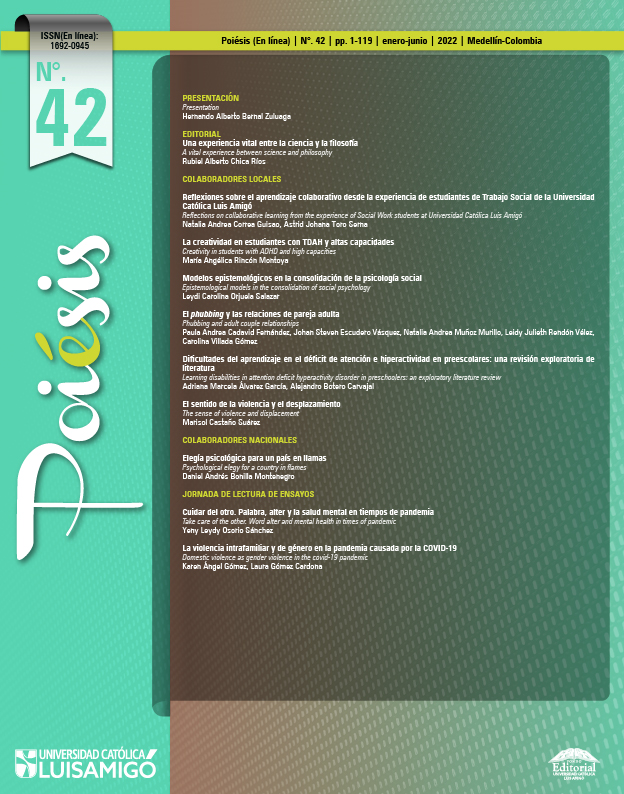Phubbing and adult couple relationships
DOI:
https://doi.org/10.21501/16920945.3792Keywords:
Addictions, Cellular, Communication, Conflict, Consumption, Phubbing, TechnologyAbstract
Objective: to understand the effects generated by Phubbing in adult couple relationships. Materials: the research is qualitative and phenomenological, for this we work with life stories collected through an in-depth interview, which was designed taking into account the categories of analysis. Population: for the field work there were five people, young adults between 25 and 40 years of age. Methodology: the present research, from February to November 2020, was conducted under a qualitative approach with a phenomenological design, which leads to a broad understanding and interpretation of the phenomenon, focused on the subjective reality of the informants, it is a dynamic approach where the hypothesis and questions can be expressed at any time (Hernández Sampieri, 2014). Results: it is recognized that this phenomenon is significantly interfering in couple relationships, fostering feelings of abandonment and even in some cases of distrust. Conclusion: the consumption of new technologies allows conflicting appreciations, as there are positions in favor and against, in any case the phenomenon is conflictive when it is not used rationally and mediatically, becoming a communicative barrier.
Downloads
References
Alvarado Campos, D., Cárdenas Pocasangre, A., & Martínez, J. R. (2014). El impacto del phubbing como brecha en las comunicaciones y relaciones interpersonales de la generación [Tesis de pregrado, Universidad Dr. José Matías Delgado]. https://webquery.ujmd.edu.sv/siab/bvirtual/BIBLIOTECA%20VIRTUAL/TESIS/03/CMN/0002155-ADTESAI.pdf
Álvarez Menéndez, M., & Moral Jiménez, M de la V. (2020). Phubbing, uso problemático de teléfonos móviles y de redes sociales en adolescentes y déficits en autocontrol. Health and Addictions, 20(1), 113-125. https://doi.org/10.21134/haaj.v20i1.487
Benedetti Corso, K., Haselein Knoll, K., & Vanderlei Cassanego, P. (2018). Partner Phubbing: Um estudo sobre as causas e implicações do uso (excessivo) do Smartphone nos Relacionamentos Amorosos [Presentación de escrito]. XVI Mostra de Iniciação Científica Pós-graduação Pesquisa e Extensão, Brasil. http://dx.doi.org/10.18226/35353535.v5.2016.78
Capilla Garrido, E., & Cubo Delgado, S. (2017). Phubbing. Conectados a la red y desconectados de la realidad. Un análisis en relación al bienestar psicológico. Revista de Medios y Educación, (50), 173-185. http://dx.doi.org/10.12795/pixelbit.2017.i50.12
Caro Mantilla, M. (2017). Adicciones tecnológicas: ¿Enfermedad o conducta adaptativa? MediSur, 15(2), 251-260. https://www.medigraphic.com/pdfs/medisur/msu-2017/msu172n.pdf
Delena, M. C. (2014). Adicción tecnológica [Trabajo fin de grado, Universidad de Palermo]. https://adinarosario.com.ar/wp-content/uploads/2020/10/V.1987adiccion.tecnologica.pdf
Chotpitayasunondh, V., & Douglas, K. M. (2016). How “phubbing” becomes the norm: The antecedents and consequences of snubbing via smartphone. Computers in Human Behavior, 63(1), 9-18. https://doi.org/10.1016/j.chb.2016.05.018
González-Rivera, J., Segura-Abreu, L., & Urbistondo-Rodríguez, V. (2018a). Phubbing en las relaciones románticas: Uso del celular, satisfacción en la pareja, bienestar psicológico y salud mental. Interacciones, 4(2), 81-91. https://doi.org/10.24016/2018.v4n2.117
González-Rivera, J. A., Hernández Gato, I., Martínez Núñez, R., Matos López, J., Galindo Tirado, M., & García Rivera, S. (2018b). Interferencia de la tecnología en las relaciones de pareja y su impacto en la salud mental de la mujer puertorriqueña. Revista Puertorriqueña de Psicología, 29(1), 56-71. http://www.ojs.repsasppr.net/index.php/reps/article/view/412/344
Hernández Sampieri, R., Fernández Collado, C., & Baptista Lucio, M. P. (2014). Metodología de la investigación (6a. ed.). McGraw-Hill.
Junco, R., & Cotten, S. R. (2012). No A 4 U: The relationship between multitasking and academic performance. Computers & Education, 59(2), 505–514. https://doi.org/10.1016/j.compedu.2011.12.023
Junquera, C. (2016). Desconectados del entorno y conectados a la red: tan cerca pero tan lejos. KubernÉtica, 2-8. https://www.kubernetica.com/2015/01/13/desconectados-del-entorno-y-conectados-a-la-red-tan-cerca-pero-tan-lejos/
Leggett, C., & Rossouw, P. J. (2014). The impact of technology use on couple relationships: A neuropsychological perspective. International Journal of Neuropsychotherapy, 2(1), 44-99. http://dx.doi.org/10.12744/ijnpt.2014.0044-0099
Pedrero Pérez, E., Rodríguez Monje, M., & Ruiz Sánchez, J. (2012). Adicción o abuso del teléfono móvil. Revisión de la literatura. Adicciones, 24(2), 139-152. http://dx.doi.org/10.20882/adicciones.107
Peñaherrera Vaca, A. L. (2015). Análisis de la falta del otro y su relación con el neologismo denominado phubbing [Tesis de grado, Pontificia Universidad Católica del Ecuador]. http://repositorio.puce.edu.ec/handle/22000/9797
Peñuela, M., Paternina, J., Moreno, D., Camacho, L., Acosta, L., & De León, L. (2014). El uso de los smartphones y las relaciones interpersonales de los jóvenes universitarios en la ciudad de Barranquilla (Colombia). Salud Uninorte, 30(3), 335-346.
Published
How to Cite
Issue
Section
License
Copyright (c) 2022 Poiésis

This work is licensed under a Creative Commons Attribution-NonCommercial-NoDerivatives 4.0 International License.
La revista y los textos individuales que en esta se divulgan están protegidos por las leyes de copyright y por los términos y condiciones de la Licencia Creative Commons Atribución-No Comercial- 4.0 Internacional. Permisos que vayan más allá de lo cubierto por esta licencia pueden encontrarse en http://www.funlam.edu.co/modules/fondoeditorial/ Derechos de autor.











